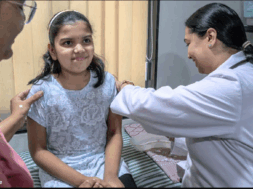
Covid-19: WHO Working on “Universal Vaccine”
Manas Dasgupta
NEW DELHI, Feb 3: As the scientists expressed doubts if the current vaccines will work effectively against variants of Omicron that is fast taking over many parts of the world by storm, the World Health Organisation said it had been discussing possibilities of a universal vaccine that work against all variants of the Covid virus.
“A pan-coronavirus vaccine or pan-SARS vaccine is the Holy Grail and would be ideal. Scientifically, it is plausible and possible, but all these are being worked on and we will have to wait and see,” the Chief Scientist at the WHO Dr Soumya Swaminathan said on Thursday. She compared it with efforts to create a universal influenza vaccine. Currently, the influenza shot has to be modified every year because of new strains.
She rejected the idea of attaining herd immunity through natural infection only to fight against Covid. It would be “foolish” and would entail “huge costs,” she said. The WHO has always maintained this stand. About the new Omicron sub-variant, she said that BA.2 is more potent than BA.1 and its transmission is more than other sub-variants. It’s taking a grip in some countries, especially India and Denmark, she added.
But the central government on Thursday said the peak of the third COVID-19 wave driven by the highly transmissible coronavirus variant Omicron is slightly lower than that of the second wave, which swept the country last year and killed lakhs of people. The daily Covid cases crossed four lakhs when India reached the second wave’s peak, the Health Ministry’s Joint Secretary Lav Agarwal said.
The country today reported 1.72 lakh fresh cases, half the cases recorded on January 21, which was the peak, according to the government. Cases have been falling since then. With 1,72,433 people testing positive for coronavirus infection in a day, India’s total tally of COVID-19 cases rose to 4,18,03,318, while the active cases decreased to 15,33,921, according to the Union Health Ministry data updated on Thursday.
The death toll climbed to 4,98,983 with 1,008 daily fatalities, the data updated at 8 am stated. The active cases constitute 3.67% of the total infections, while the national COVID-19 recovery rate decreased to 95.14%, the health ministry said.
A reduction of 87,682 cases was recorded in the active COVID-19 caseload in a span of 24 hours. The daily positivity rate was recorded at 10.99% while the weekly positivity rate was 12.98%, according to the health ministry. The number of recoveries rose to 3,97,70,414, while the case fatality rate was 1.19%.
“We are seeing a decline in (Covid) cases. We don’t want to use words like wave and peak. There are still some areas where cases are increasing. Covid management strategies still need to be implemented because overall we are still seeing high number of cases,” Agarwal said replying to a question whether the third wave peak had been reached.
Daily Covid cases in the two weeks between January 21 and February 3 have fallen by 50 per cent from 3,47,254 to 1,72,433. During the same period, positivity rate or the number of infections per 100 tests fell by 39 per cent from 17.94 per cent to 10.99 per cent, which shows a clear decline in daily positivity rate indicating decreased spread of Covid infection.
Although the number of districts with positivity rate over 10 per cent has fallen from over 400 a week ago to less than 300 now, two states – Kerala and Mizoram – are reporting increase in positivity rate and cases. The government said data indicates that unlike in the previous Covid surge, with the current coronavirus variant surgery is safe and not associated with higher chances of complications in or deaths of Covid patients. “Patients who need surgery need not be denied surgical intervention presently,” the Health Ministry said in a statement today.
A higher number of younger patients were admitted to hospitals in the third wave, the government said, adding treatment showed significantly improved outcomes and lesser complications.
But Dr Swaminathan said the WHO could not yet comment on the impact of Omicron as it’s a relatively new variant and studies were still going on to determine if it could cause reinfection and how it affects long term immunity. “Two months is too little time to know if it causes reinfection and how it affects long term immunity. We saw some studies where the blood of patients who recovered from the new variant helped with Delta infection but we don’t know if that will be true for future variants,” she said.
On how current vaccines against Covid are responding to Omicron, she said lab level studies show antibodies are less likely to neutralise the new variant, even less than the Delta variant which was already less responsive to the vaccine than the previous variants that were taken into account while developing the vaccines. However, the good news is that clinical data shows fewer cases of deaths and severe disease in vaccinated patients. There’s no need to be concerned about whether the current vaccines work on the Omicron strain, she said.
“The vaccines that we are using for protection in terms of reducing hospitalisations and deaths are working very well. All of them help us. The elderly and vulnerable are much better protected now. It shows that the vaccines are effective and a good defence mechanism,” she said, adding that we should not take into account just antibody response but also carefully look at clinical data and study other factors like T-cell response.
“Hybrid immunity is the strongest immunity we can have at the moment – Hybrid is when one has been infected with Omicron and has also got the vaccine doses,” she said. On whether there will be more mutations, she said it was an RNA virus and it’s natural for it to keep mutating.
Dr Swaminathan stressed studying local data to make decisions on booster shots. “It is ideal to have one’s own data coming from one’s own studies. It is not ideal or possible to take another country’s data and try to work out one’s strategy. Having local scientific research and data is crucial,” she said. WHO has been clear on the need to prioritise some groups to start the booster vaccines. Increasing age and underlying comorbidities are risk factors, she said.
The immune system wanes as you get older and that’s why it needs additional stimulus to raise immune levels, she said when asked why senior citizens with comorbidities are prioritised for booster shots when many young people also live with comorbidities. She appreciated India’s efforts in vaccinating such a large population. “India has done a commendable job in vaccinating a large population, given its size and complexities involved in getting people vaccinated,” she said.
On whether Covid pills that can be administered orally are working, she confirmed that they indeed were working against all variants. Monoclonal antibody treatments, however, don’t seem to be working, she added.
Meanwhile, the New Zealand government on Thursday said it would end its quarantine requirements for incoming travellers and reopen its borders, a change welcomed by thousands of citizens abroad who have endured long waits to return home.
Since the start of the pandemic, New Zealand has enacted some of the world’s strictest border controls. Most incoming travellers need to spend 10 days in a quarantine hotel room run by the military, a requirement that has created a bottleneck at the border.













